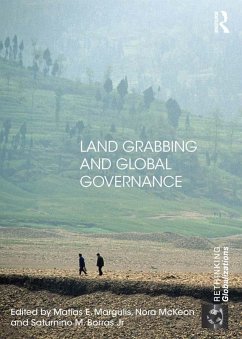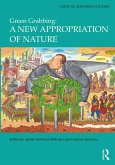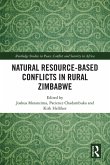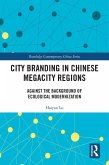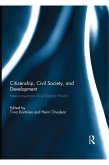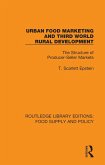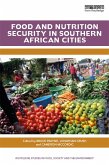Land Grabbing and Global Governance (eBook, PDF)
Redaktion: Margulis, Matias E.; Borras Jr., Saturnino; Mckeon, Nora
57,95 €
57,95 €
inkl. MwSt.
Sofort per Download lieferbar

29 °P sammeln
57,95 €
Als Download kaufen

57,95 €
inkl. MwSt.
Sofort per Download lieferbar

29 °P sammeln
Jetzt verschenken
Alle Infos zum eBook verschenken
57,95 €
inkl. MwSt.
Sofort per Download lieferbar
Alle Infos zum eBook verschenken

29 °P sammeln
Land Grabbing and Global Governance (eBook, PDF)
Redaktion: Margulis, Matias E.; Borras Jr., Saturnino; Mckeon, Nora
- Format: PDF
- Merkliste
- Auf die Merkliste
- Bewerten Bewerten
- Teilen
- Produkt teilen
- Produkterinnerung
- Produkterinnerung

Bitte loggen Sie sich zunächst in Ihr Kundenkonto ein oder registrieren Sie sich bei
bücher.de, um das eBook-Abo tolino select nutzen zu können.
Hier können Sie sich einloggen
Hier können Sie sich einloggen
Sie sind bereits eingeloggt. Klicken Sie auf 2. tolino select Abo, um fortzufahren.

Bitte loggen Sie sich zunächst in Ihr Kundenkonto ein oder registrieren Sie sich bei bücher.de, um das eBook-Abo tolino select nutzen zu können.
The new wave of land grabbing that followed the recent global food crisis has prompted considerable debate about its social, environmental and political consequences. This volume theorizes and empirically investigates efforts to govern land grabs at global and regional level.
This book was published as a special issue of Globalizations .
- Geräte: PC
- ohne Kopierschutz
- eBook Hilfe
- Größe: 5.78MB
Andere Kunden interessierten sich auch für
![Green Grabbing: A New Appropriation of Nature (eBook, PDF) Green Grabbing: A New Appropriation of Nature (eBook, PDF)]() James FairheadGreen Grabbing: A New Appropriation of Nature (eBook, PDF)56,95 €
James FairheadGreen Grabbing: A New Appropriation of Nature (eBook, PDF)56,95 €![Natural Resource-Based Conflicts in Rural Zimbabwe (eBook, PDF) Natural Resource-Based Conflicts in Rural Zimbabwe (eBook, PDF)]() Natural Resource-Based Conflicts in Rural Zimbabwe (eBook, PDF)42,95 €
Natural Resource-Based Conflicts in Rural Zimbabwe (eBook, PDF)42,95 €![Extractivisms, Existences and Extinctions (eBook, PDF) Extractivisms, Existences and Extinctions (eBook, PDF)]() Markus KrögerExtractivisms, Existences and Extinctions (eBook, PDF)0,99 €
Markus KrögerExtractivisms, Existences and Extinctions (eBook, PDF)0,99 €![City Branding in Chinese Megacity Regions (eBook, PDF) City Branding in Chinese Megacity Regions (eBook, PDF)]() Haiyan LuCity Branding in Chinese Megacity Regions (eBook, PDF)42,95 €
Haiyan LuCity Branding in Chinese Megacity Regions (eBook, PDF)42,95 €![Citizenship, Civil Society and Development (eBook, PDF) Citizenship, Civil Society and Development (eBook, PDF)]() Citizenship, Civil Society and Development (eBook, PDF)42,95 €
Citizenship, Civil Society and Development (eBook, PDF)42,95 €![Urban Food Marketing and Third World Rural Development (eBook, PDF) Urban Food Marketing and Third World Rural Development (eBook, PDF)]() T. Scarlett EpsteinUrban Food Marketing and Third World Rural Development (eBook, PDF)33,95 €
T. Scarlett EpsteinUrban Food Marketing and Third World Rural Development (eBook, PDF)33,95 €![Food and Nutrition Security in Southern African Cities (eBook, PDF) Food and Nutrition Security in Southern African Cities (eBook, PDF)]() Food and Nutrition Security in Southern African Cities (eBook, PDF)44,95 €
Food and Nutrition Security in Southern African Cities (eBook, PDF)44,95 €-
-
-
The new wave of land grabbing that followed the recent global food crisis has prompted considerable debate about its social, environmental and political consequences. This volume theorizes and empirically investigates efforts to govern land grabs at global and regional level.
This book was published as a special issue of Globalizations.
This book was published as a special issue of Globalizations.
Dieser Download kann aus rechtlichen Gründen nur mit Rechnungsadresse in A, B, BG, CY, CZ, D, DK, EW, E, FIN, F, GR, HR, H, IRL, I, LT, L, LR, M, NL, PL, P, R, S, SLO, SK ausgeliefert werden.
Produktdetails
- Produktdetails
- Verlag: Taylor & Francis
- Seitenzahl: 232
- Erscheinungstermin: 23. Mai 2016
- Englisch
- ISBN-13: 9781134952168
- Artikelnr.: 57006876
- Verlag: Taylor & Francis
- Seitenzahl: 232
- Erscheinungstermin: 23. Mai 2016
- Englisch
- ISBN-13: 9781134952168
- Artikelnr.: 57006876
- Herstellerkennzeichnung Die Herstellerinformationen sind derzeit nicht verfügbar.
Matias E. Margulis is Assistant Professor of International Studies at the University of Northern British Columbia. His current book project explores the global regulation of agricultural trade and food security. He is a former Canadian trade policy advisor and has worked on global food security policy at several multilateral organizations. Nora McKeon studied history at Harvard and political science at the Sorbonne before joining the Food and Agriculture Organization (FAO) of the United Nations where she became responsible for the overall direction of FAO's policy and programme interaction with civil society. She now divides her time between research, teaching and activism around food systems, peasant farmer movements and UN-civil society relations. Saturnino M. Borras Jr. is Associate Professor at the International Institute of Social Studies (ISS) in The Hague, Adjunct Professor at the College of Humanities and Development Studies (COHD) of China Agricultural University in Beijing, and a Fellow of the Amsterdam-based Transnational Institute (TNI) and of the California-based Food First.
1. Land Grabbing and Global Governance: Critical Perspectives Section One:
Theorizing Land Grabbing, Globalization and Governance 2. Land Grabs Today:
Feeding the Disassembling of National Territory 3. Land Grabbing as
Security Mercantilism in International Relations 4. Governing the Global
Land Grab: Multipolarity, Ideas, and Complexity in Transnational Governance
Section Two: Transnational Actors and Emerging Global Land Governance 5.
The Governance of Gulf Agro-Investments 6. 'One Does Not Sell the Land Upon
Which the People Walk': Land Grabbing, Transnational Rural Social
Movements, and Global Governance 7. International Human Rights and
Governing Land Grabbing: A View from Global Civil Society 8. Certification
Schemes and the Governance of Land: Enforcing Standards or Enabling
Scrutiny? 9. The Challenge of Global Governance of Land Grabbing: Changing
International Agricultural Context and Competing Political Views and
Strategies Section Three: Review of Recent Global Land Governance
Instruments 10. The FAO Voluntary Guidelines on the Responsible Governance
of Tenure of Land, Fisheries and Forests 11. The Principles of Responsible
Agricultural Investment 12. The Minimum Human Rights Principles Applicable
to Large-Scale Land Acquisitions or Leases 13. Private Governance and Land
Grabbing: The Equator Principles and the Roundtable on Sustainable Biofuels
14. Restrictions to Foreign Acquisitions of Agricultural Land in Argentina
and Brazil
Theorizing Land Grabbing, Globalization and Governance 2. Land Grabs Today:
Feeding the Disassembling of National Territory 3. Land Grabbing as
Security Mercantilism in International Relations 4. Governing the Global
Land Grab: Multipolarity, Ideas, and Complexity in Transnational Governance
Section Two: Transnational Actors and Emerging Global Land Governance 5.
The Governance of Gulf Agro-Investments 6. 'One Does Not Sell the Land Upon
Which the People Walk': Land Grabbing, Transnational Rural Social
Movements, and Global Governance 7. International Human Rights and
Governing Land Grabbing: A View from Global Civil Society 8. Certification
Schemes and the Governance of Land: Enforcing Standards or Enabling
Scrutiny? 9. The Challenge of Global Governance of Land Grabbing: Changing
International Agricultural Context and Competing Political Views and
Strategies Section Three: Review of Recent Global Land Governance
Instruments 10. The FAO Voluntary Guidelines on the Responsible Governance
of Tenure of Land, Fisheries and Forests 11. The Principles of Responsible
Agricultural Investment 12. The Minimum Human Rights Principles Applicable
to Large-Scale Land Acquisitions or Leases 13. Private Governance and Land
Grabbing: The Equator Principles and the Roundtable on Sustainable Biofuels
14. Restrictions to Foreign Acquisitions of Agricultural Land in Argentina
and Brazil
1. Land Grabbing and Global Governance: Critical Perspectives Section One:
Theorizing Land Grabbing, Globalization and Governance 2. Land Grabs Today:
Feeding the Disassembling of National Territory 3. Land Grabbing as
Security Mercantilism in International Relations 4. Governing the Global
Land Grab: Multipolarity, Ideas, and Complexity in Transnational Governance
Section Two: Transnational Actors and Emerging Global Land Governance 5.
The Governance of Gulf Agro-Investments 6. 'One Does Not Sell the Land Upon
Which the People Walk': Land Grabbing, Transnational Rural Social
Movements, and Global Governance 7. International Human Rights and
Governing Land Grabbing: A View from Global Civil Society 8. Certification
Schemes and the Governance of Land: Enforcing Standards or Enabling
Scrutiny? 9. The Challenge of Global Governance of Land Grabbing: Changing
International Agricultural Context and Competing Political Views and
Strategies Section Three: Review of Recent Global Land Governance
Instruments 10. The FAO Voluntary Guidelines on the Responsible Governance
of Tenure of Land, Fisheries and Forests 11. The Principles of Responsible
Agricultural Investment 12. The Minimum Human Rights Principles Applicable
to Large-Scale Land Acquisitions or Leases 13. Private Governance and Land
Grabbing: The Equator Principles and the Roundtable on Sustainable Biofuels
14. Restrictions to Foreign Acquisitions of Agricultural Land in Argentina
and Brazil
Theorizing Land Grabbing, Globalization and Governance 2. Land Grabs Today:
Feeding the Disassembling of National Territory 3. Land Grabbing as
Security Mercantilism in International Relations 4. Governing the Global
Land Grab: Multipolarity, Ideas, and Complexity in Transnational Governance
Section Two: Transnational Actors and Emerging Global Land Governance 5.
The Governance of Gulf Agro-Investments 6. 'One Does Not Sell the Land Upon
Which the People Walk': Land Grabbing, Transnational Rural Social
Movements, and Global Governance 7. International Human Rights and
Governing Land Grabbing: A View from Global Civil Society 8. Certification
Schemes and the Governance of Land: Enforcing Standards or Enabling
Scrutiny? 9. The Challenge of Global Governance of Land Grabbing: Changing
International Agricultural Context and Competing Political Views and
Strategies Section Three: Review of Recent Global Land Governance
Instruments 10. The FAO Voluntary Guidelines on the Responsible Governance
of Tenure of Land, Fisheries and Forests 11. The Principles of Responsible
Agricultural Investment 12. The Minimum Human Rights Principles Applicable
to Large-Scale Land Acquisitions or Leases 13. Private Governance and Land
Grabbing: The Equator Principles and the Roundtable on Sustainable Biofuels
14. Restrictions to Foreign Acquisitions of Agricultural Land in Argentina
and Brazil
